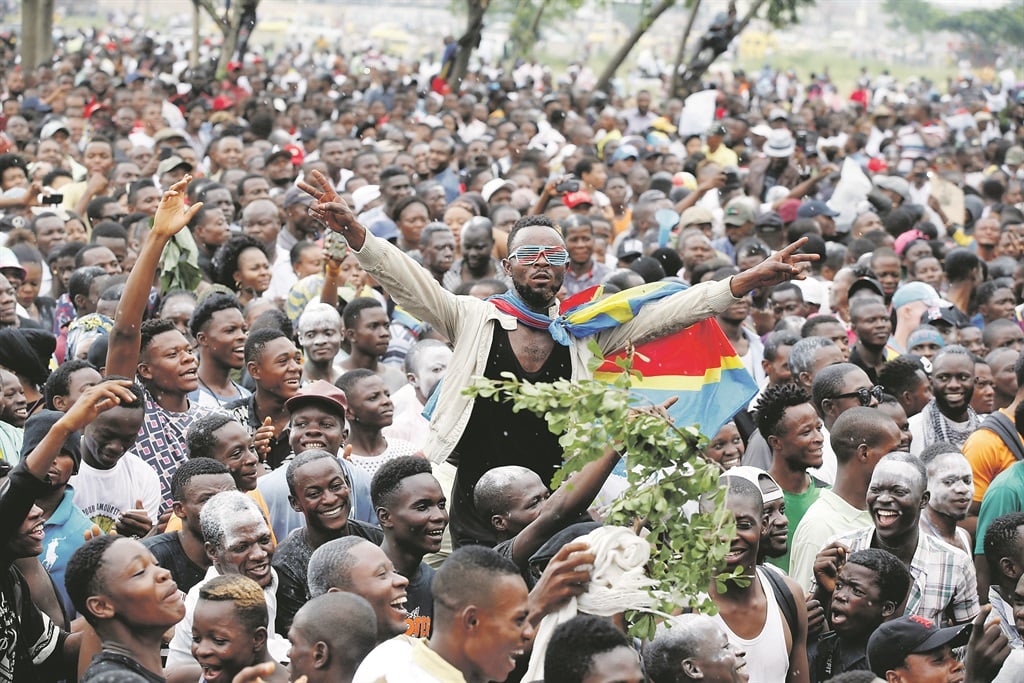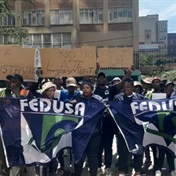
The runner-up in the Democratic Republic of Congo’s presidential election said on Friday he in fact won a landslide victory with more than 60% of votes and will file a formal fraud complaint.
The vote was intended to be Congo’s first democratic transfer of power in six decades.
But instead it threatens to reawaken violence in the huge nation where millions have died during civil wars since the 1990s.
“When you know you are in the right, you are not allowed to remain home,” Martin Fayulu said, urging supporters to “rise up” and contest the results with him.
Though pre-election polls predicted a landslide for Fayulu, a businessperson and former manager at Exxon Mobil, the national election board, Ceni, said he lost to another opposition candidate, Felix Tshisekedi.
Fayulu’s camp said its tally showed he won 62% of votes, to Tshisekedi’s 19%.
His supporters believe authorities rigged the result in a deal to protect members of President Joseph Kabila’s outgoing administration and to maintain his influence over security forces.
The influential Catholic Church also rejected the official result based on tallies by Cenco, its bishops conference’s 40 000-strong observer mission.
France and former colonial power Belgium also expressed doubts.
In comments to the UN Security Council via a teleconference on Friday, Ceni president Corneille Nangaa defended the vote’s credibility and attacked Cenco.
“I’d be very interested to know what party they work for,” said Nangaa.
“I challenge anyone to say they have the pretension to have collected all the vote tallies.”
Cenco president Marcel Utembi, at the same table as Nangaa at UN headquarters in Kinshasa, told the Security Council the bishops’ mission was independent and its conclusions were based on tally sheets representing 72% of the ballots.
Cenco has not stated publicly who it believes won the election, but three diplomats briefed on its findings told Reuters it had determined Fayulu was the clear winner.
The head of the UN peacekeeping-mission in Congo, Leila Zerrougui, said preliminary reports from her mission and other observers all indicated the vote “happened satisfactorily despite the technical, logistical and security problem”.
Yet internal UN reports noted allegations of irregularities across the country, including militia fighters reportedly forcing voters to select candidates from the ruling coalition.
Another domestic observer mission said it witnessed vote tampering and other “major” irregularities.
“It seems important to us to exhort our partners and friendly countries not to throw fuel on the fire by speculating about the result, but to work for the consolidation of democracy and peace,” said Congo’s UN ambassador, Ignace Gata Mavita wa Lufuta.
VIOLENCE FEARED
Fayulu’s camp was expected to raise these issues with Congo’s highest court yesterday. It has asked the election board to publish results from every polling station.
“We know the Constitutional Court is composed of Kabila’s people, but we do not want to give any chance to Kabila and his team to say ... you didn’t follow the law,” Fayulu told the BBC.
Many Congolese fear the dispute could restart a cycle of unrest in a country where wars causing hunger and disease have ravaged the population.
Around the nation of 80 million people, there have been isolated incidents of post-election violence. Police confronted protesters in the eastern city of Goma on Friday, killing at least one person, a witness said.
In the northern city of Kisangani, the police and army responded to student protests, and in nearby Mangobo a ruling party office was set on fire, according to an internal UN report.
These incidents followed clashes on Thursday in Kikwit in which security forces killed four protesters.
“This country has already suffered a lot from all this violence,” said a Kinshasa motorbike taxi driver said. “These protests should not be happening, because Tshisekedi is the people’s choice.”
The officially declared winner shot to prominence when he inherited the Union for Democracy and Social Progress party leadership after the death in 2017 of his father Etienne Tshisekedi.
His genial manner and resemblance to his portly father have won him support. But he lacks his experience, clout and firebrand reputation.
Before the vote, Tshisekedi said Kabila had nothing to fear should he win. Fayulu, by contrast, is backed by former rebel Jean-Pierre Bemba and former governor Moïse Katumbi, both Kabila rivals.
“The people of the DRC have waited 58 years for a peaceful democratic transfer of power and have sacrificed too much for this election result not to reflect their votes,” said a bipartisan group of US senators
The stage now seems set for the exit of Kabila, who has ruled the resource-rich nation with an iron fist since 2001.
The country’s bishops urged “everyone to show civic maturity” and to avoid resorting to violence.
President Cyril Ramaphosa’s office issued a measured response to the voting results, commending “all parties and stakeholders in the DRC for ensuring peace and stability during the election processes”.
The statement did not congratulate Tshisekedi, nor did it mention the reported irregularities.
TALK TO US
What do you make of Tshisekedi’s victory?
SMS us on 35697 using the keyword DRC and tell us what you think. Please include your name and province. SMSes cost R1.50. By participating, you agree to receive occasional marketing material




 Publications
Publications
 Partners
Partners








